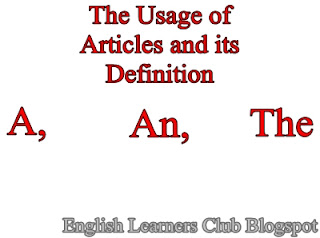The 3 articles in English are a, an and the. The learner has to decide noun-by-noun which one of the articles to use.
The word a (which becomes an when the next word begins with a vowel - a, e, i, o, u) is called the indefinite article because the noun it goes with is indefinite or general. The meaning of the article a is similar to the number one, but one is stronger and gives more emphasis. It is possible to say I have a book or I have one book, but the second sentence emphasizes that I do not have two or three or some other number of books.
The word the is known as the definite article and indicates a specific thing. The difference between the sentences I sat on a chair and I sat on the chair is that the second sentence refers to a particular, specific chair, not just any chair.
Many nouns, especially singular forms of countable nouns must have an article. In English, it is not possible to say I sat on chair without an article, but a demonstrative or possessive adjective can be used instead of an article as in the sentences I sat on that chair and I sat on his chair.
Uncountable nouns
You cannot say a/an with an uncountable noun.You cannot put a number in front of an uncountable noun. (You cannot make an uncountable noun plural.) You use an uncountable noun with no article if you mean that thing in general. You use the with an uncountable noun when you are talking about a particular example of that thing.
Countable nouns
You can put a number in front of a countable noun. (You can make a countable noun plural.) You can put both a/an and the in front of a count noun.
You must put an article in front of a singular count noun.
You use a plural countable noun with no article if you mean all or any of that thing. You usually use a/an with a countable noun the first time you say or write that noun.
You use the with countable nouns:
the second and subsequent times you use the noun in a piece of speech or writing when the listener knows what you are referring to (maybe because there is only one of that thing) You use an (not a) when the next word (adverb, adjective, noun) starts with a vowel sound.
You use the with countable nouns:
the second and subsequent times you use the noun in a piece of speech or writing when the listener knows what you are referring to (maybe because there is only one of that thing) You use an (not a) when the next word (adverb, adjective, noun) starts with a vowel sound.
Note:
The above rules apply whether there is or there is not an adjective in front of the noun.
Some nouns can be either countable or uncountable, depending on the context and meaning:
Some nouns can be either countable or uncountable, depending on the context and meaning:
Do you have paper? I want to draw a picture. (uncountable = a sheet of paper)
Can you get me a paper when you’re at the shop? (countable = a newspaper)uncountable nouns are often preceded by phrases such as: a lot of .. (luck), a piece of .. (cake), a bottle of .. (milk), a grain of .. (rice).
* Instead of an article, the noun can also be preceded by a determiner such as this, that, some, many or my, his, our, etc
Following are some of the most important guidelines listed above, with example sentences:
| You use an uncountable noun with no article if you mean all or any of that thing. | I need help! I don't eat cheese. Do you like music? |
| You use the with an uncountable noun when you are talking about a particular example of that thing. | Thanks for the help you gave me yesterday. I didn't eat the cheese. It was green! Did you like the music they played at the dance? |
| You usually use a/an with a count noun the first time you say or write that noun. | Can I borrow a pencil, please? There's a cat in the garden! Do you have an mp3 player? |
| You use the with count nouns the second and subsequent times you use the noun, or when the listener already knows what you are referring to (maybe because there is only one of that thing). | Where's the pencil I lent you yesterday? I think the cat belongs to the new neighbors. I dropped the mp3 player and it broke. Please shut the door! |
| You use a plural count noun with no article if you mean all or any of that thing. | I don't like dogs. Do they have children? I don't need questions. Give me answers! |

Komentar
Posting Komentar